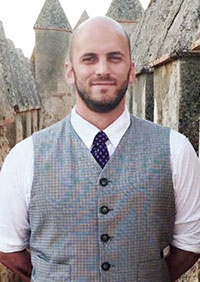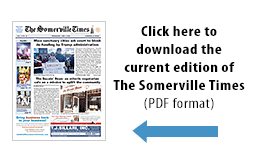
Owner of backbar, Sam.
By JT Thompson
Sam: shaved head and full beard, the young white owner of backbar, a hipster cocktail bar located behind an anonymous looking metal door in a little alley just off the main plaza of Union Square.
When I walk into backbar one sunny afternoon at 4:30, Sam is sitting at the bar, wearing brown jeans, red sneakers and a mauve, long-sleeved t-shirt. I was looking for a bartender to approach, and he was wearing an apron, with leather straps across his back, serious looking things, like what a whiskey barrel craftsman or gunslinger would wear.
Later, I discovered that when you mention Sam to people around the Square, male or female, you get an appreciative grin and a slight shake of the head, as if to say, What a rascal! At the time, I hadn’t met him before, so it was only when we got talking that I found out that he was the owner.
I walk up, make my pitch to him, and he agrees to talk to me.
“Just need to post the ‘drink of the day’ first. Gotta keep up with that social media stuff,” he says with a grin.
While he disappears into the back, I order a drink and wait for him on one of the grey, cushioned benches which circle the room that opens onto the bar. I look around at the bar Sam has created.
On one wall of the room is an intricate, sprawling black and white mural of a Prohibition-era roadster next to a woman in a sweeping gown covered with roses. Pop music from the 30s plays on the speakers. Star Wars paraphernalia is scattered on the shelves, a stormtrooper helmet, a Boba Fett helmet, a couple of Darth Vader bedtime story books, on a shelf stuffed with books about cocktails and bartending. There’s a love expressed here of things which are classic – beautiful, well crafted, with history – and a love of the era when a bartender was an outlaw; there’s also a sense of humor.
Above the bar is a giant pyramid shaped skylight, which lets the soft afternoon light pour into the narrow space.
A chalkboard with beautifully drawn writing announces the drink of the day, the drink of the week, and the ‘milk punch’ of the week, whatever that is, with names like Smoke Shop, Left Hand of Darkness, Martinique Medicine.
The bartender isn’t pretentious about explaining the complicated ingredients of the drinks to me, he is delighted, as though he is getting to share a secret.
I am sipping my Smoke Shop (tobacco infused whiskey, among other things) when Sam comes out to join me.
He knows how to look hip, but, as I discover, this is not an ironic, postmodern guy. Sturdily self-confident, he speaks with conviction, very open minded and devoted to change, but firm in his beliefs, which he expresses easily and articulately.
Sam grew up just west of Boston. It’s not clear when his father’s side of the family came to America – “there’s several generations of English in there” – but his mother’s side, the Irish Kennedys, who came to America in the 1700s, have a lineage that stretches back to the 11th century.
“For my next tattoo, I’m going to get the family coat of arms, a dolphin and some kind of bird, with the words, Avise la fin, Consider the end.”
The town Sam grew up in is “probably the wealthiest small town in the state, maybe the country. Which is totally disgusting. But growing up there was great.”
Biking to his friends’ houses. Running around in the woods. The diner in the little town center, where his father took him and his brother every Wednesday. Wandering in the bookstore owned by his best friend’s mom. A small, but excellent public school, with kids that stayed in all the way through high school.
“I prided myself on being friends with people from all the different cliques.” A skill which has served him well as a bartender.
Sam started bartending in college, in Minnesota, as a way to make money on the side, and fell in love with it. The energy, the people, the craft behind the drinks. He then bartended in Seattle, Boston and Hawaii, which is where he was when he got an email from a friend, asking if he wanted to start a bar in Union Square.
“I thought – Union Square? That’s the part of Somerville I still thought of as Slummerville. But here I am, and it’s working.”
Sam was only 26 when he started backbar; that was six years ago.
As we talk, he occasionally pauses to ask one of his staff a question – Karen, did that wine come in? What did you think? Hey Jeff, are we good on the drink of the day bitters?
He is relaxed with them, obviously trusts them, loves having things run well, stays engaged. He must be a great boss to have.
While we are talking, he is in constant motion. Rubbing his hands against his knees. Shifting side to side. Leaning forward, leaning back. Looking up to the left when he is thinking something through, looking back at me again when he has his thought firm.
But this is not nervous energy. It is contained, controlled energy. This is a powerhouse of a person, built to move fast for long periods of time.
Which must be useful behind the bar.
Sam sees his life story as particularly American because “of the freedom of choice I’ve had for a career. In other countries, you have to know much earlier. In Japan, you have to be an apprentice, spend decades to become a master, maybe inherit a restaurant. In France, by 13 you have to pick where you’re headed. If you want to be a doctor, you have to choose by 13.
“I can see some merit in that. But I wholeheartedly believe in, and appreciate, the freedom to choose to change my mind. I don’t know if I’m going to want to own a bar the rest of my life.”
A long pause.
“There’s probably lots of things that I don’t appreciate about being American.
“But I don’t believe the myth that we’re the greatest. We’re not. Not our economy, not our school system, not our healthcare. Not in how we take care of our citizens. We don’t have free healthcare. Maternity leave.
“I’m jealous of Sweden. Voting day is a national holiday, everyone votes. If it’s close, they do it again. Not like that Florida bullshit, hanging chads, one or two votes.
“There’s lots of systemic things I wish we could change.
“But I probably don’t realize the many good things gifted to me by being an American. Freedoms. Choices.”
He looks at me with a gentle shrug.
“Are there things about America that you do think are great?”
Sam rubs his hands together, looks down, then looks up again.
“Four months ago I would have given you a different answer.”
A dark look crosses his face, then he shrugs it off.
“I like the idea of the melting pot. Trying to welcome people from all over the world, letting them create a new identity.
“How you identify yourself is important. What’s the list – name, gender, race, religion, political leanings, nationality.
“What’s beautiful about America is that we all have different ways of identifying ourselves.
“We’re taught that we’re important, that our individualism matters. You’re not a cog in a machine. You’re not a sheep in a herd. You’re encouraged to create your own identity, one that resonates for you.
“For me – my starting point is white male in America.
“I don’t think of those as my identifying characteristics, though they’re important to others.
“The way I define myself is as an atheist.
“Which is not a popular one. But allowed.”
A pause.
“For now.”
When Sam and I are done talking, he goes back to the bar and gets into deep discussion with his bartenders. Customers start drifting in, looking over the menu and the chalkboard, ordering drinks, starting lively conversations. The drinks are steeped in American cocktail traditions, but innovative; the atmosphere is welcoming and relaxed. Sam has created a little community center here, an oasis of good humored beauty. A small piece of America.















This piece was great. An intimate look at an interesting, intelligent character. His forthright observations speak to many of us in these unpredictable times. I look forward to the next “Portrait.”